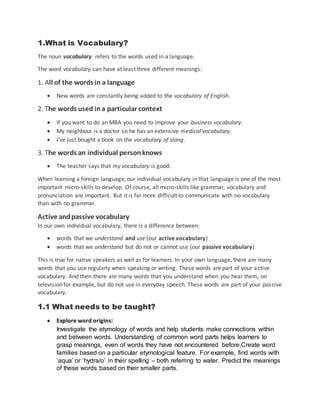
Vocabulary
- 1. 1.What is Vocabulary? The noun vocabulary refers to the words used in a language. The word vocabulary can have at least three different meanings: 1. All of the words in a language New words are constantly being added to the vocabulary of English. 2. The words used ina particular context If you want to do an MBA you need to improve your business vocabulary. My neighbour is a doctor so he has an extensive medical vocabulary. I've just bought a book on the vocabulary of slang. 3. The words an individual personknows The teacher says that my vocabulary is good. When learning a foreign language, our individual vocabulary in that language is one of the most important micro-skills to develop. Of course, all micro-skills like grammar, vocabulary and pronunciation are important. But it is far more difficult to communicate with no vocabulary than with no grammar. Active andpassive vocabulary In our own individual vocabulary, there is a difference between: words that we understand and use (our active vocabulary) words that we understand but do not or cannot use (our passive vocabulary) This is true for native speakers as well as for learners. In your own language, there are many words that you use regularly when speaking or writing. These words are part of your active vocabulary. And then there are many words that you understand when you hear them, on television for example, but do not use in everyday speech. These words are part of your passive vocabulary. 1.1 What needs to be taught? Explore word origins: Investigate the etymology of words and help students make connections within and between words. Understanding of common word parts helps learners to grasp meanings, even of words they have not encountered before.Create word families based on a particular etymological feature. For example, find words with ‘aqua’ or ‘hydra/o’ in their spelling – both referring to water. Predict the meanings of these words based on their smaller parts.
- 2. Explain the word’s connotation: This is the relationship between the word and the feelings about it, whether positive, neutral or negative. Understanding how words can be interpreted enables students to use them with greater precision.Try compiling a word scale. Place a word on one end of the scale and a word with opposite meaning or intensity at the other. For example, if students are struggling to use words instead of ‘said’, place the word ‘whisper’ at the lower end and ‘bellow’ at the higher end. Students work together to build the scale, searching for synonyms like ‘shout’, ‘yell’, ‘plead’, ‘intone’ and placing them at appropriate points on the scale. Explaining where and when the word is or isn’t used: This can be anything from a word’s formality to its datedness. You might use ‘loo’ at home, ‘toilet’ in public or ‘lavatory’ at the Mayor’s Ball, and ‘ball’ would be outdated. This helps students understand how words can make people sound. Try demonstrating this by writing an inappropriately informal text to highlight the importance of word choice. Alternatively, write an overly formal text to convey a simple, friendly message. Building the relationship from words to other words: This is how students understand what words have the same, similar, opposite or related meanings. Taking them through words synonyms, antonyms and words or concept that build off words helps them develop their lexical stores. Set aside time for word study. Provide graphic organisers to assist learners to make comparisons and build connections. Showing what words occur together: This is called ‘collocation’ – it’s why we say ‘see the big picture’ instead of ‘see the tall picture’ or 10 apples is fewer than 15 apples rather than less. Collocation must occur in context, so shared reading is an excellent forum for this sort of word study. But also have a bit of fun by using synonyms to create ‘nearly but not quite’ versions of well-known sayings. How affixes change meaning: Most words can be changed by adding affixes – prefixes before the word and suffixes after the word. But a rich vocabulary can be developed by understanding the purpose of prefixes and suffixes and how they impact part of speech and inform meaning.To help students get to grips with affixes and how they can change meaning, select a ‘friendly’ root word and explore all of the word building creations that are possible. For example, the word ‘social’ can be added to create: socialise, socially, unsocial, antisocial, unsociable, etc 1.2 The importance of teaching vocabulary:
- 3. The language consists of words and without understanding those words , we lack the means of understanding that language. Certainly, once the problem of the vocabulary items is solved , consequently a great deal of the language teaching problems will be solved. 1.3 Here are some techniques of teaching Vocabulary: 1.Matching exercises Divide students into groups Give them a list of words and their meanings. The students will discuss these words. They may use dictionaries. Anger determine Conceal clash Conflict fury Dead hide Decide obsolete 2. Write synonym and antonyms of given words in a box: WORDS SYNONYM ANTONYM Cheerful Retirement Create Expensive 3. Working with your group, try to think of two or three questions you could ask the class, using these words. SUNNY , CLICHÉ , VULNERABLE, ABROAD 4. Look at these sets of words. How are the words in each box related to “PLAY’ PLAY
- 4. FOOTBALL MOBILE GAME EXERCISE INJURY 5. Vocabulary Games For example STOP THE BUS Animals Colours Countries Food ALPHABETS ANIMALS COLORS FOOD COUNTRIES P Panda Pink Pizza Pakistan A D M B
- 5. Legal Vocabulary Game: There are some words given in word bank and student have to search those words from the box.